Conference Summary 26-28 January 2021

20/F, Yardley Commercial Building No.3 Connaught Road West, Sheung Wan Hong Kong Tel: (852) 2523 2083 Fax: (852) 2523 6116 Email: info@cusef.org.hk Website: www.cusef.org.hk China Center for International Economic Exchanges No.5, Yong Ding Men Nei Street, Xicheng District Beijing, China Tel: (8610) 8336 2165 Fax: (8610) 8336 2165 Email: ef@cciee.org.cn Website: english.cciee.org.cn
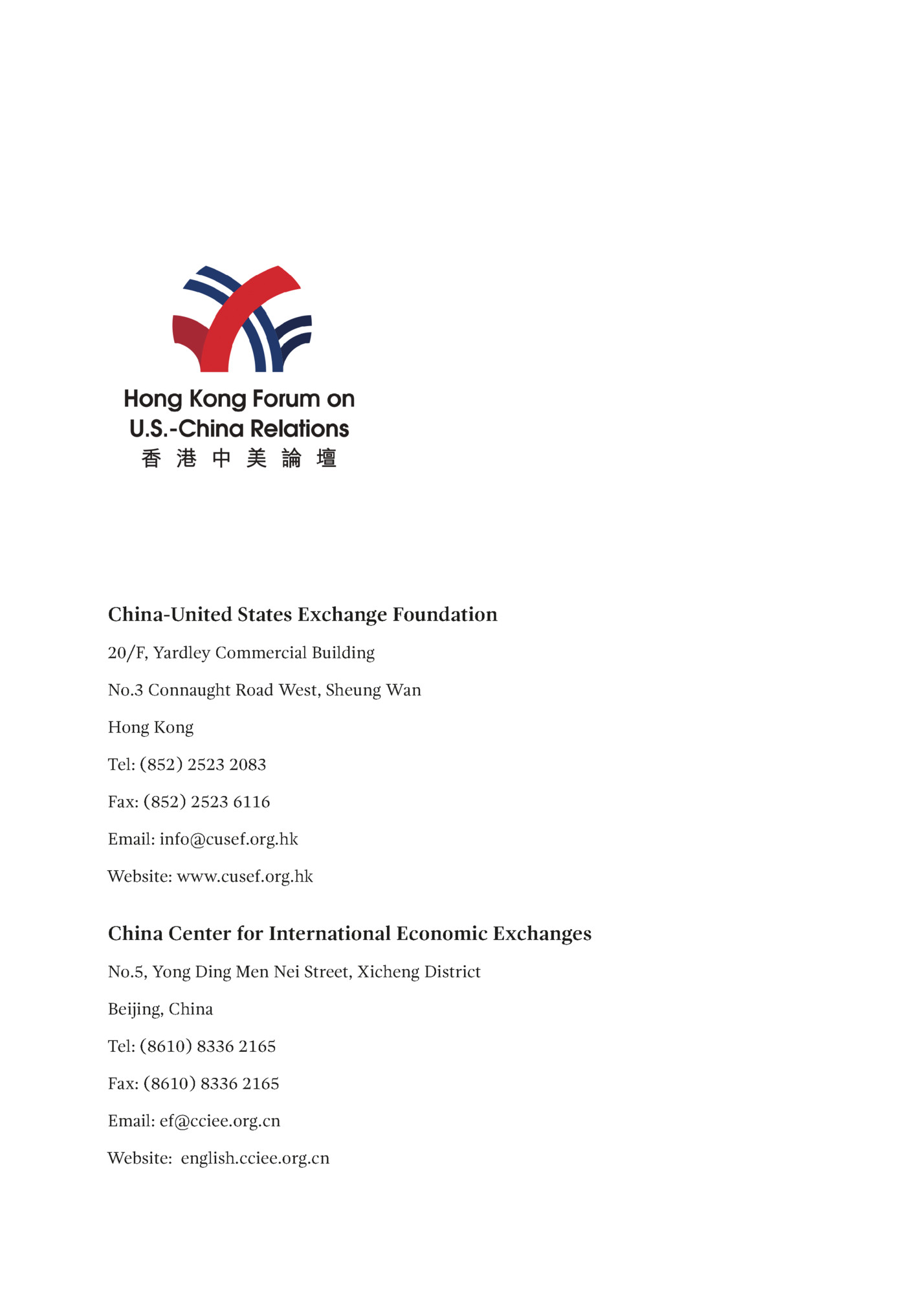
Tu n g C h e e - h w a C h a i r m a n o f t h e C h i n a - U n i t e d S t a t e s E xc h a n g e Fo u n d a t i o n ; V i c e C h a i r m a n o f t h e 1 3 t h C P P CC N a t i o n a l C o m m i t t e e o f C h i n a ; F o r m e r C h i e f E x e c u t i v e o f H o n g Ko n g S p e c i a l A d m i n i s t r a t i v e Re g i o n First of all, I want to thank all the speakers who joined us in this event. Do you know that our speakers were actually spread out in nine different time zones? Our European friends dialed in at 2 am in the morning. My great appreciation to all, for your sacrifice and your contributions. Second, I want to thank all the participants for watching or listening in. I hope the discussions in the past few days have been helpful to you — in understanding the challenges and what should be done to put the China-U.S. relationship back on the road to progress. Indeed, our many speakers and panelists have pointed out what should be done. If I were to summarize the thoughts expressed in these three days, I’d say: Return to the dialogue table. Restore respect and trust. Allow competition and cooperation to coexist. Think about the developing countries and low-income people that need help. Know that all mankind lives on this same planet and all share a common destiny. ACT now! The road is not easy, but together we’ll find a way. One discussion is never sufficient. Changes of circumstances will require us to revisit the issues and rethink. When the pandemic and travel restrictions are over, I’d be happy to host this forum again. We can then meet, face to face, in this wonderful city of Hong Kong. 1
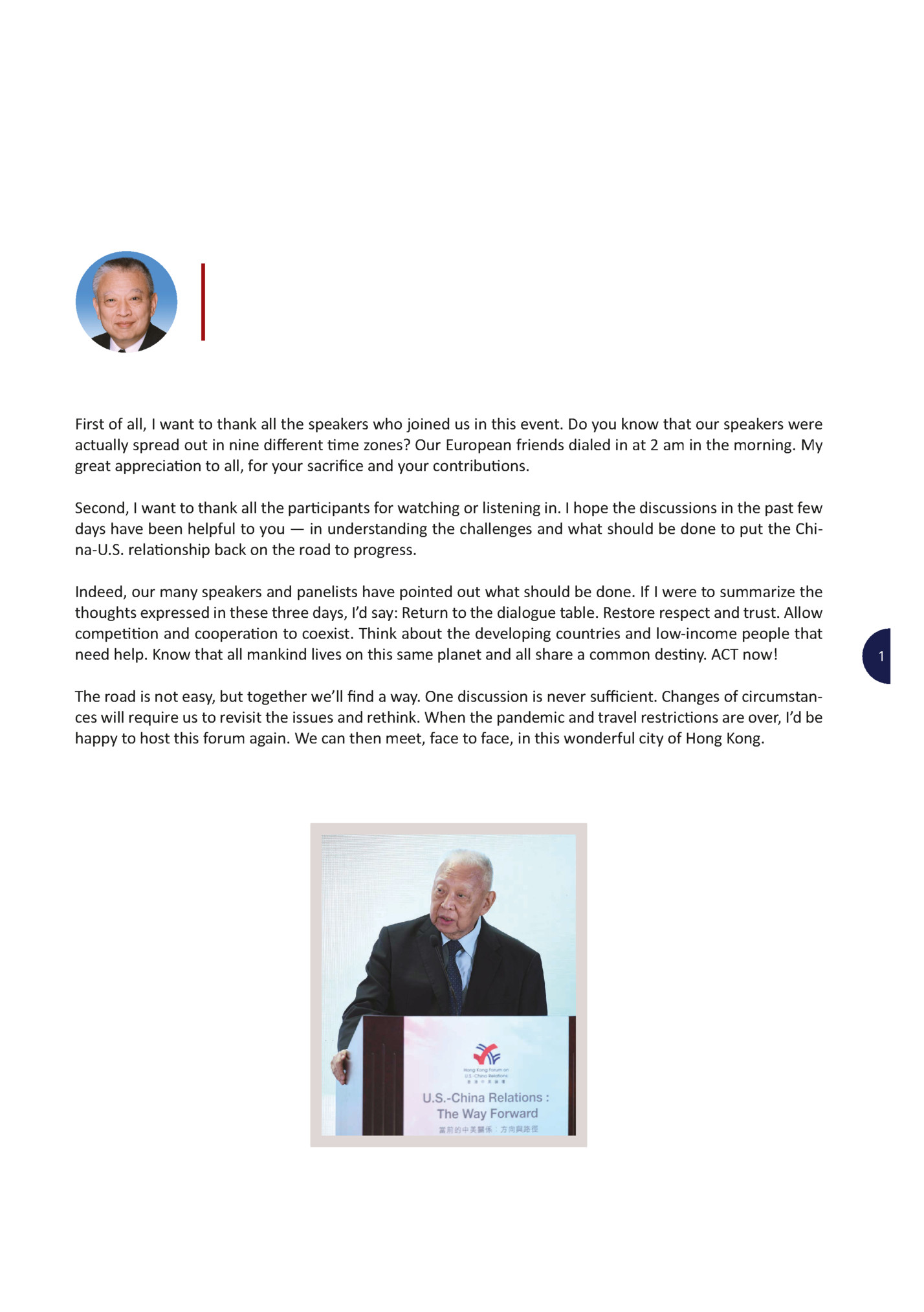
Acknowledgement ...................................................................................................... P. 1 Executive Summary ................................................................................................... P. 3 Conference Agenda ................................................................................................... P. 5 Opening Session: U.S.-China Relations — Outlook Keynote Speeches .............................................................................................. P. 12 Session 1 Trade and the Economy Keynote Speeches Panel Remarks 2 .............................................................................................. P. 19 ................................................................................................... P. 21 Session 2 Trade and the Economy Keynote Speeches Panel Remarks .............................................................................................. P. 26 ................................................................................................... P. 28 Session 3 Technology and Global Challenges Keynote Speeches Panel Remarks .............................................................................................. P. 33 ................................................................................................... P. 35 Session 4 People-to-People Exchange Keynote Speeches Panel Remarks ............................................................................................. P. 39 .................................................................................................... P. 41 Appendix Welcome Remarks: HK, Greater Bay Area: A Potent Engine ........................................ This year’s webinar can be found at www.chinausfocus.com/special/2021forum HONG KONG FORUM ON U.S.-CHINA RELATIONS THE WAY FORWARD Conference Summary P. 48
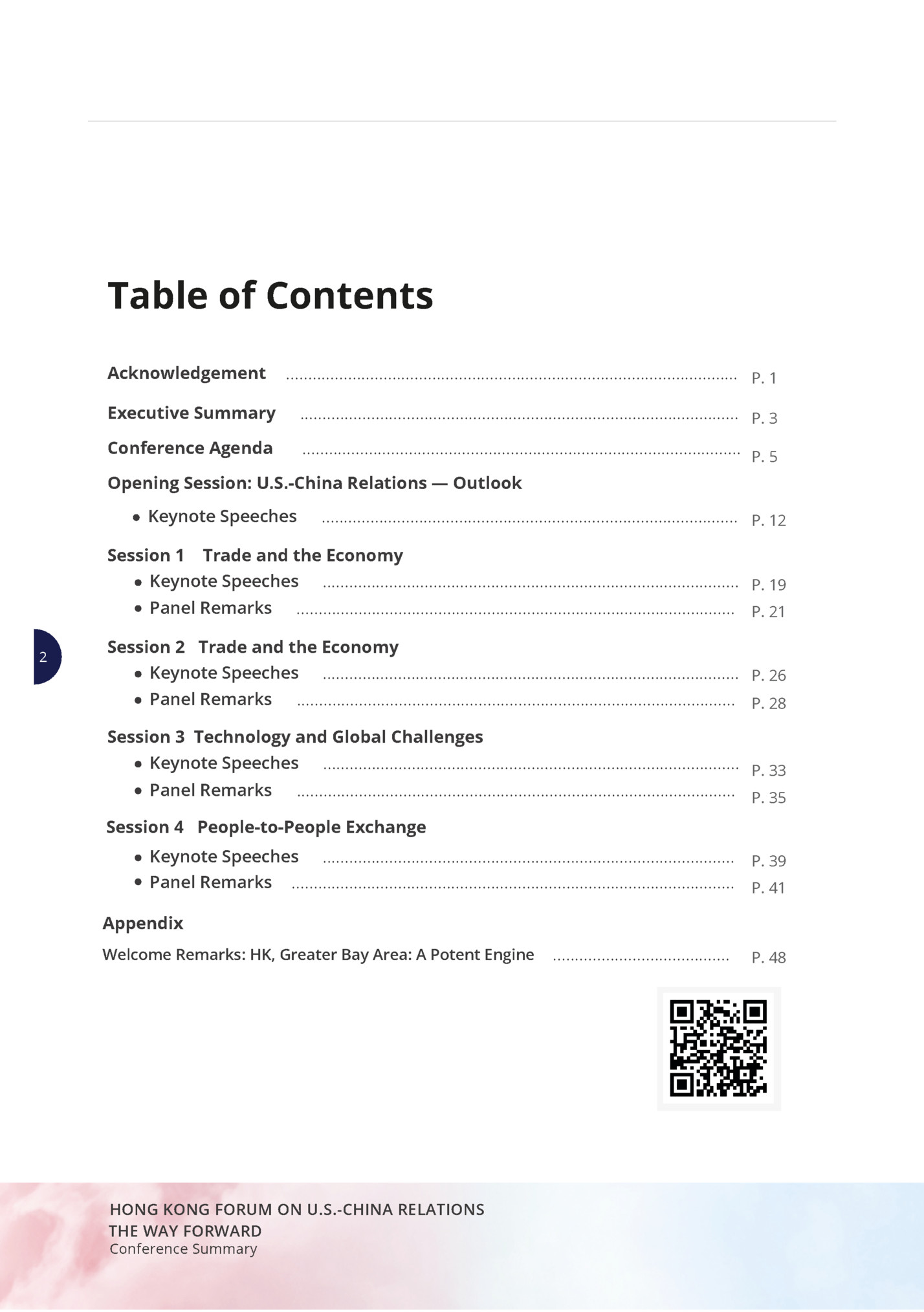
EXECUTIVE SUMMARY After a challenging year in which the world was tested by the impacts of COVID-19, global leaders and experts recognized the unprecedented changes facing the United States-China relationship and urged the two countries to work together to usher stability and security back into the international community. Following the inauguration of President Joe Biden in the United States, distinguished experts gathered virtually over three days, Jan. 26 to 28, 2021, to assess the future of bilateral relations. They examined key issues and areas of cooperation in the CUSEF’s second international forum themed “The Way Forward,” co-hosted by the China Center for International Economic Exchanges (CCIEE). Last year was a year of unprecedented turmoil in which the pandemic sent humanity a message: The world is fundamentally changing, and the U.S.-China relationship remains crucial. The “Hong Kong Forum on U.S.-China Relations” featured more than 40 past and current major stakeholders and influencers, including former prime minister of Japan Yasuo Fukuda, CCIEE Chairman and former vice premier of the People’s Republic of China Zeng Peiyan, former prime minister of Italy and former president of the European Commission Romano Prodi, former Prime Minister of Canada Jean Chretien, former U.S. secretary of commerce Carlos Gutierrez, current government officials, senior business leaders and renowned scholars from the United States, China and other Asia-Pacific countries. They came together to address the current challenges facing bilateral relations. The discussion focused on how China and the U.S. should move forward in light of the new U.S. administration and used the opportunity to identify areas of cooperation between the two countries to tackle global challenges, including climate change, the environment, food security, cybersecurity and COVID-19. Former prime minister of Japan Yasuo Fukuda stressed that less division and instability is something all nations are seeking, given the risks and problems that need to be resolved immediately and which cannot be solved without the support of the U.S. and its leadership, especially in international trade and finance. However, he noted, “The U.S. must first contain its biggest issue — COVID-19 — before it can help the rest of the world.” Aside from the pandemic, speakers conveyed their desire for progress through continued dialogue between U.S. and Chinese officials. Although there was a general sense of optimism around the new U.S. administration, speakers also spoke candidly about the challenges that will remain on both sides, while emphasizing the importance of global governance during an era of heightened risk. “I don’t think there will be a major change in China-U.S. relations despite the new administration. However, there will be more dialogue,” said Romano Prodi, former prime minister of Italy and former president of the European Commission. “The tensions within the U.S. and competition with China are prevalent among both the Republicans and Democrats. Thus, there will be a necessity for deeper dialogue and exchange of views.” This exchange of views must happen “not just by words but by deeds,” said former U.S senator and former. ambassador to China Max Baucus. Although the future of the relationship remains uncertain, President of the Chinese People’s Institute of Foreign Affairs (CPIFA) Wang Chao expressed confidence in the foundation of U.S.-China relations, which has been “built through our joint efforts over generations.” He added that goodwill remains unchanged and that cooperation will prevail. HONG KONG FORUM ON U.S.-CHINA RELATIONS THE WAY FORWARD Conference Summary 3
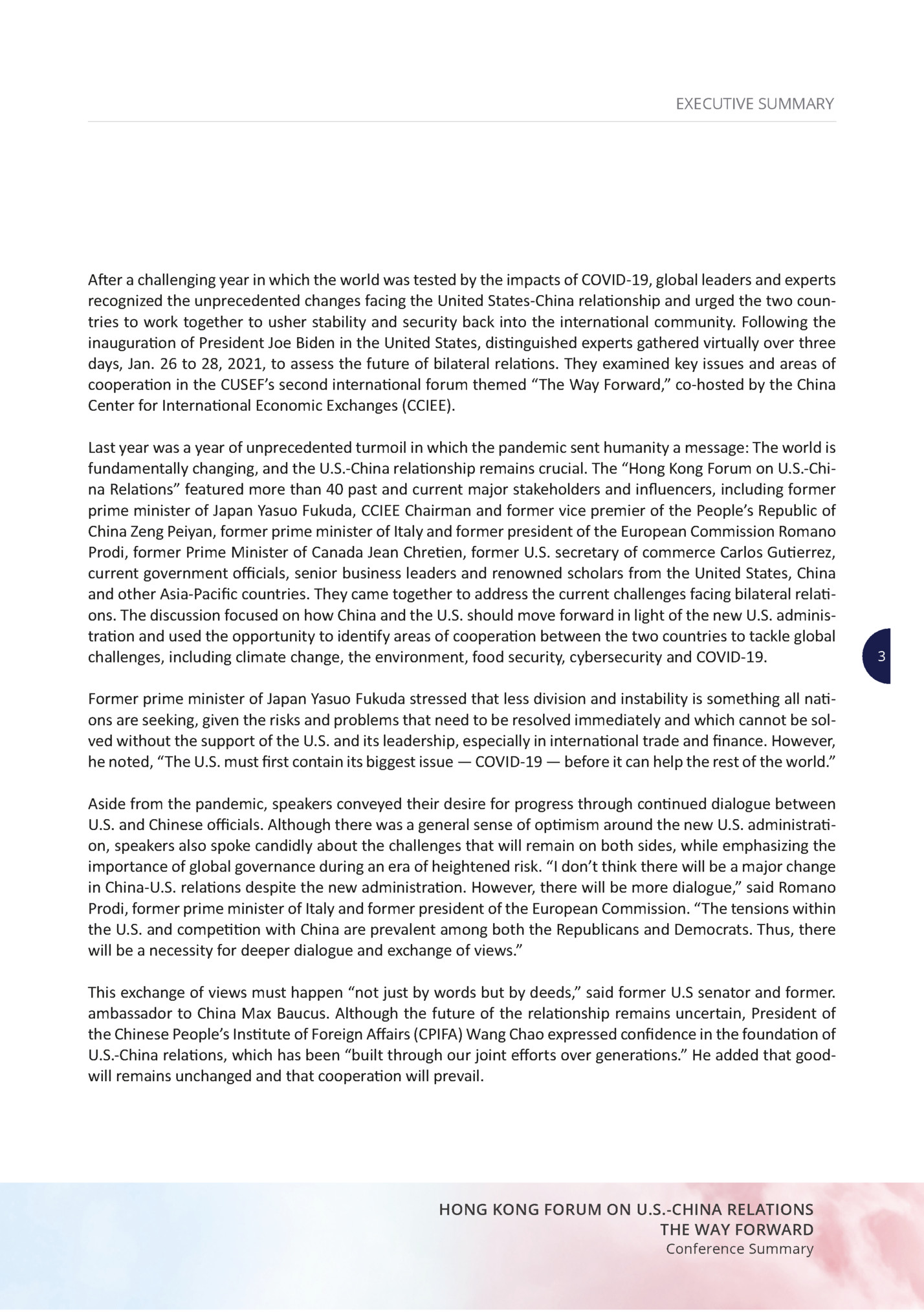
Adding to the optimism and hope for progress in both trade and policy negotiations, CCIEE Chairman Zeng Peiyan said that to seek win-win cooperation, China and the U.S. must first rebuild mutual trust by restarting and improving multilevel engagement mechanisms. Ultimately, they should use the results of those dialogues as the fundamental conduit to address issues and challenges and play a leading role in managing relations. He also stressed that the two countries must “reshape and restart economic and trade relations, which have always been the ballast and stabilizer of the overall relationship.” Emphasizing the detrimental effects of a complete China-U.S. decoupling, former U.S. secretary of commerce Carlos Gutierrez said that the bilateral relationship should not be based solely on transactions. Rather, it should encourage a more strategic partnership that increases areas of collaboration while eradicating areas of friction. “When you call someone an enemy, they become your enemy,” he said. “We are not an enemy of China, and I don’t think China is an enemy of us. Words matter.” Former U.S. Trade Representative Carla Hills expressed a similar sentiment, predicting that there will be significant changes in how the U.S. handles its international relationships. Under Biden, she said, “The tone in which we deal with all international governments, including China, will be more diplomatic.” 4 Both President Xi Jinping and President Joe Biden were the topic of several discussions during the forum. Tung Chee-hwa, founder and chairman of the CUSEF, outlined how the two countries share mutual goals and underscored the need for all nations to abide by the same rules-based system. He noted that China will work to protect that system and maintain global harmony. Addressing areas of cooperation, Mr. Tung noted: “President Biden has said that his four priorities are the pandemic, the economy, climate change and racial injustice. There is no question that the two countries can work together on at least the first three priorities.” In his opinion, “It is time to turn the page on the negatives of the past few years and start to work with one another again” because that path offers renewed hope for the future of the U.S.-China relationship. Closing the forum, Mr. Tung reiterated the importance of productive dialogue and thanked the speakers for their insightful input over the three days. “Indeed, our many speakers and panelists have pointed out what should be done,” he said. He summarized their thoughts as returning to the dialogue table, restoring respect and trust and allowing competition and cooperation to coexist. “Let’s work together now,” he said. “The road is not easy, but together we will find a way.” HONG KONG FORUM ON U.S.-CHINA RELATIONS THE WAY FORWARD Conference Summary
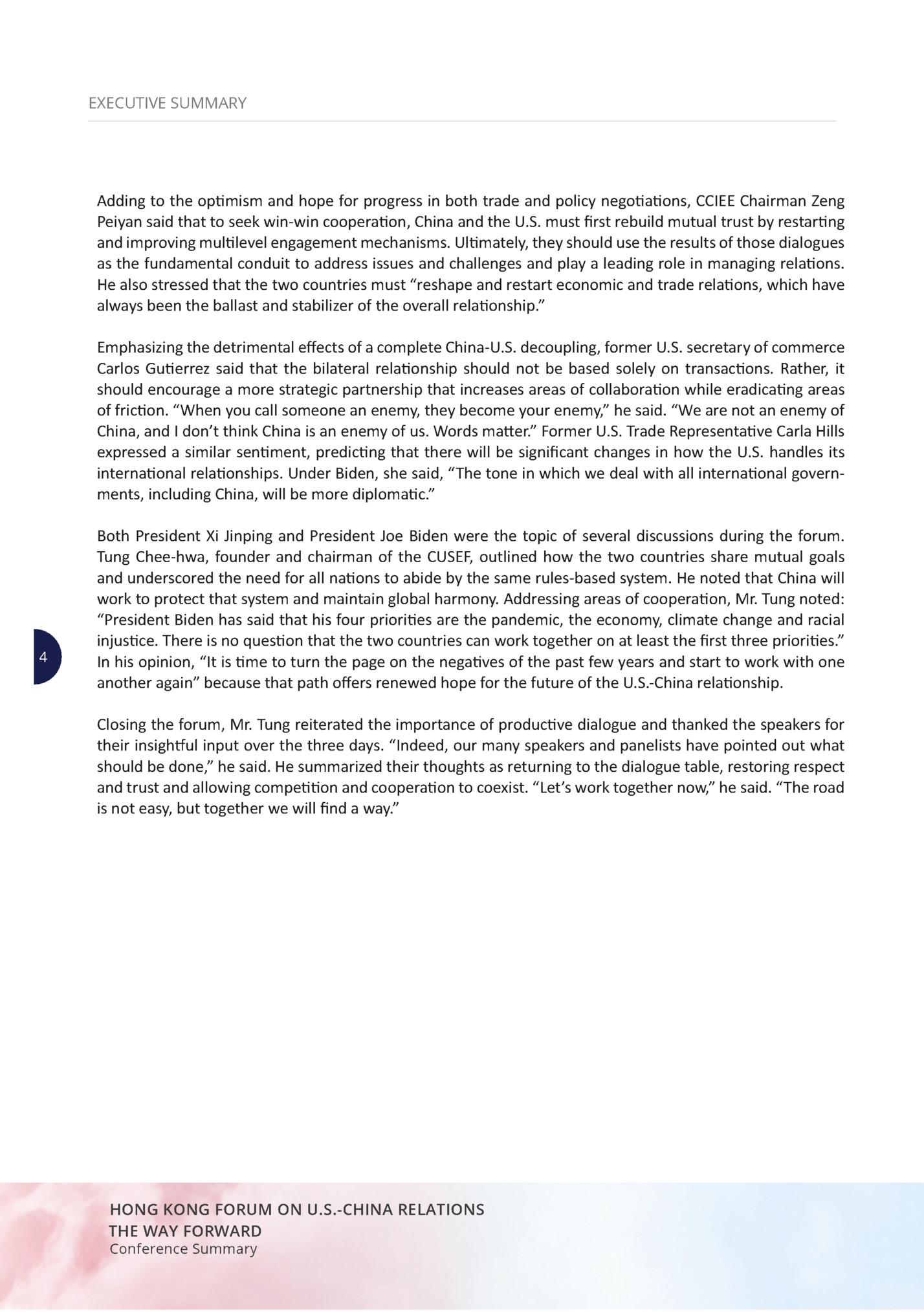
Conference Agenda Hong Kong Forum on U.S.-China Relations “The Way Forward” All dates and times are listed in Hong Kong Standard Time Event Moderator: James Chau, Editor-at-Large, China–US Focus Jan 26th, Tuesday 08:30 – 11:00 am Opening Session: U.S.-China Relations—Outlook 08:30 – 08:40 am Welcome Remarks 5 Carrie Lam, Chief Executive of Hong Kong Special Administrative Region 08:45 – 10:30 am Keynotes Zeng Peiyan, Chairman of China Center for International Economic Exchanges (CCIEE); former Vice Premier of China Jean Chretien, Former Prime Minister of Canada Romano Prodi, Former Prime Minister of Italy; Former President of the European Commission Yasuo Fukuda, Former Prime Minister of Japan Carlos Gutierrez, Former U.S. Secretary of Commerce Carla Hills, Former U.S. Trade Representative Tung Chee-hwa, Chairman of the China-United States Exchange Foundation; Vice Chairman of the 13th CPPCC National Committee of China; Former Chief Executive of Hong Kong Special Administrative Region HONG KONG FORUM ON U.S.-CHINA RELATIONS THE WAY FORWARD Conference Summary
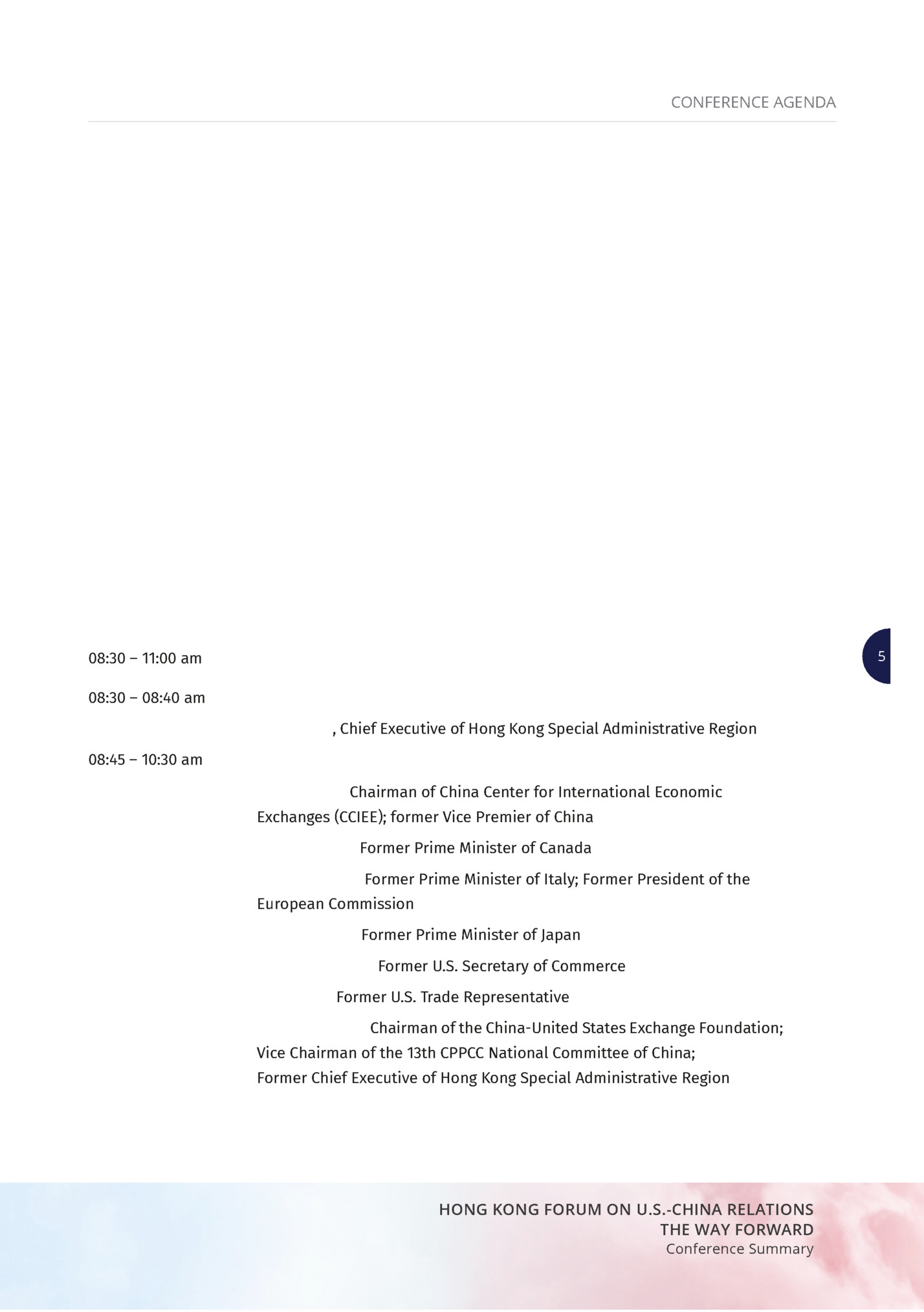
Jan 27th, Wednesday 08:30 – 10:00 am Session 1 : Trade and the Economy Coronavirus has thrown the world into its worst recession since the Second World War. Recovery won’t happen within a short time. The existing global trading system has been served a double whammy—the trade war and the pandemic. Is returning to normal, globalized order-a rule-based multilateralism-the most effective way back to global economic recovery? Between China and the US, is it most important that the two nations should resume normal communication, eliminate the tariffs against one another, restart BIT negotiation, and push for WTO reform? Moderator: Lawrence Lau, Ralph and Claire Landau Professor of Economics at the Chinese University of Hong Kong; and Kwoh-Ting Li Professor in Economic Development, Emeritus, at Stanford University. Keynotes: Michael Spence, Nobel Laureate in Economics; Philip H. Knight Professor Emeritus of Management in the Graduate School of Business and Senior Fellow of the Hoover Institution at Stanford University 6 Zhang Xiaoqiang, Executive Vice Chairman and Chief Executive Officer of China Center for International Economic Exchanges (CCIEE) Panel: Myron Brilliant, Executive Vice President and Head of International Affairs, U.S. Chamber of Commerce Kishore Mahbubani, Distinguished Fellow at the Asia Research Institute (ARI), National University of Singapore (NUS) Xu Bu, President of China Institute of International Studies Zhang Yuyan, Director of Institute of World Economics and Politics, and Chief Expert of National Institute for Global Strategy, Chinese Academy of Social Sciences (CASS) Zhu Min, Former Deputy Managing Director of IMF; Former Deputy Governor of the People’s Bank of China Chen Anning, Vice President of Ford Motor Company Group, President and CEO of Ford Motor (China) Co., Ltd HONG KONG FORUM ON U.S.-CHINA RELATIONS THE WAY FORWARD Conference Summary
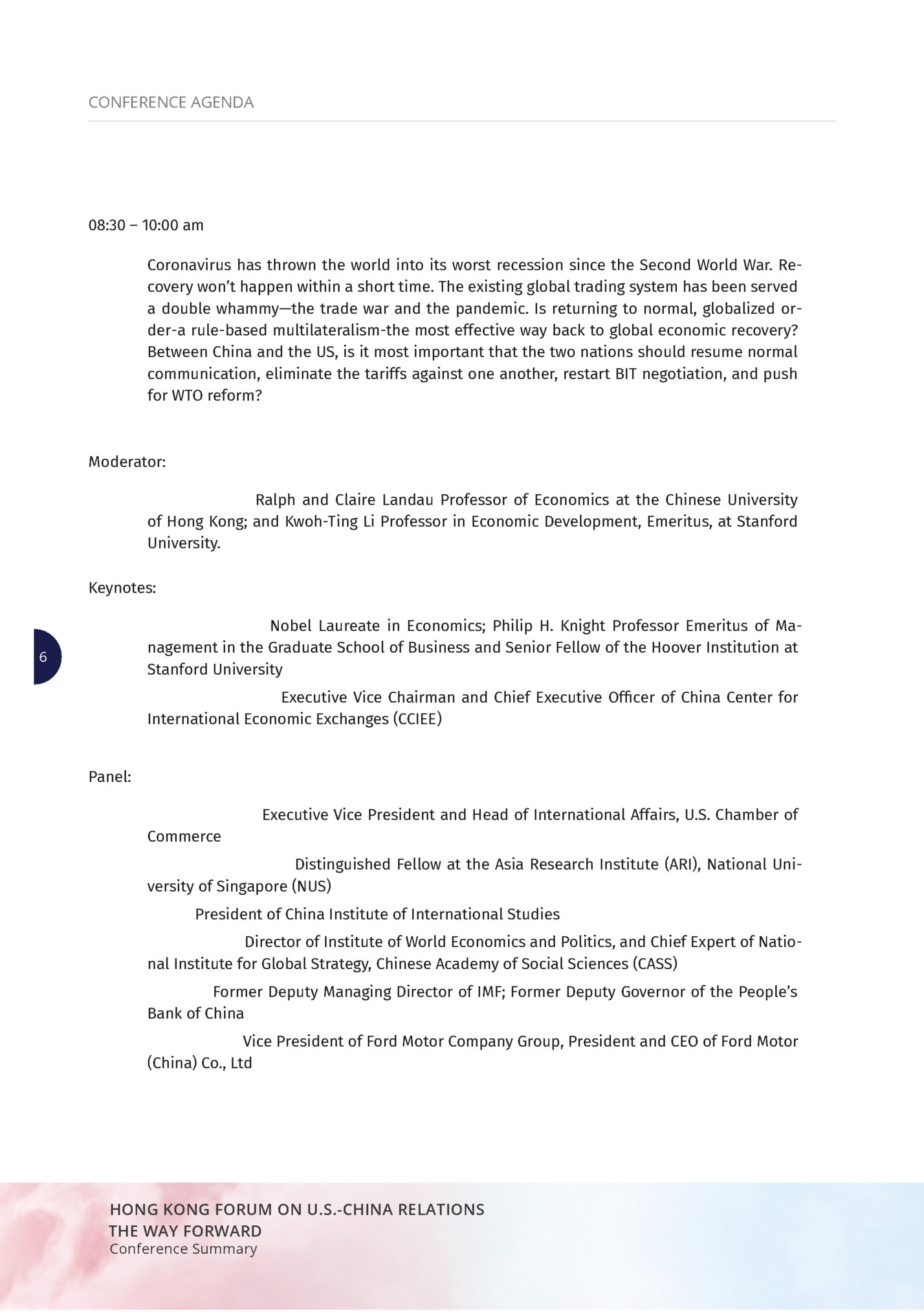
09:40 – 10:00 am Panel Discussion 10:00 – 11:30 am Session 2 : Trade and the Economy Integrating individual nation’s needs and regional interests can enhance prosperity for the region and help stabilize global economy. RCEP, the latest example of economic regionalization, is the region’s tangible action to reaffirm multinationalism, and a major step towards building an open global economy. China has also expressed its willingness to join the CPTPP. Should China and the US work together on constructing a high standard trading system that can lead to a high level Asia-Pacific free trade zone? Moderator: Victor Fung, Honorary Chairman of Li & Fung Limited and Vice Chairman of the China–United States Exchange Foundation Keynotes: Bi Jingquan, Executive Vice Chairman of China Center for International Economic Exchanges (CCIEE); Vice Chairman of the Committee on Economic Affairs of the 13th CPPCC National Committee of China Stephen Roach, Senior Fellow at Jackson Institute of Global Affairs; Senior Lecturer, School of Management, Yale University Panel : Craig Allen, President of the United States-China Business Council Chen Wenling, Chief Economist of China Center for International Economic Exchanges (CCIEE) Bob Holden, Chairman and CEO of United States Heartland China Association; Former Governor of Missouri Jerry Liu, President of Cargill China and Managing Director of Cargill Starches, Sweeteners and Texturizer (CSST) Wang Yiming, Former Vice President of Development Research Center of the State Council, China Zhu Guangyao,Former Vice Minister, Ministry of Finance, China 11:10 – 11:30 am Panel Discussion HONG KONG FORUM ON U.S.-CHINA RELATIONS THE WAY FORWARD Conference Summary 7
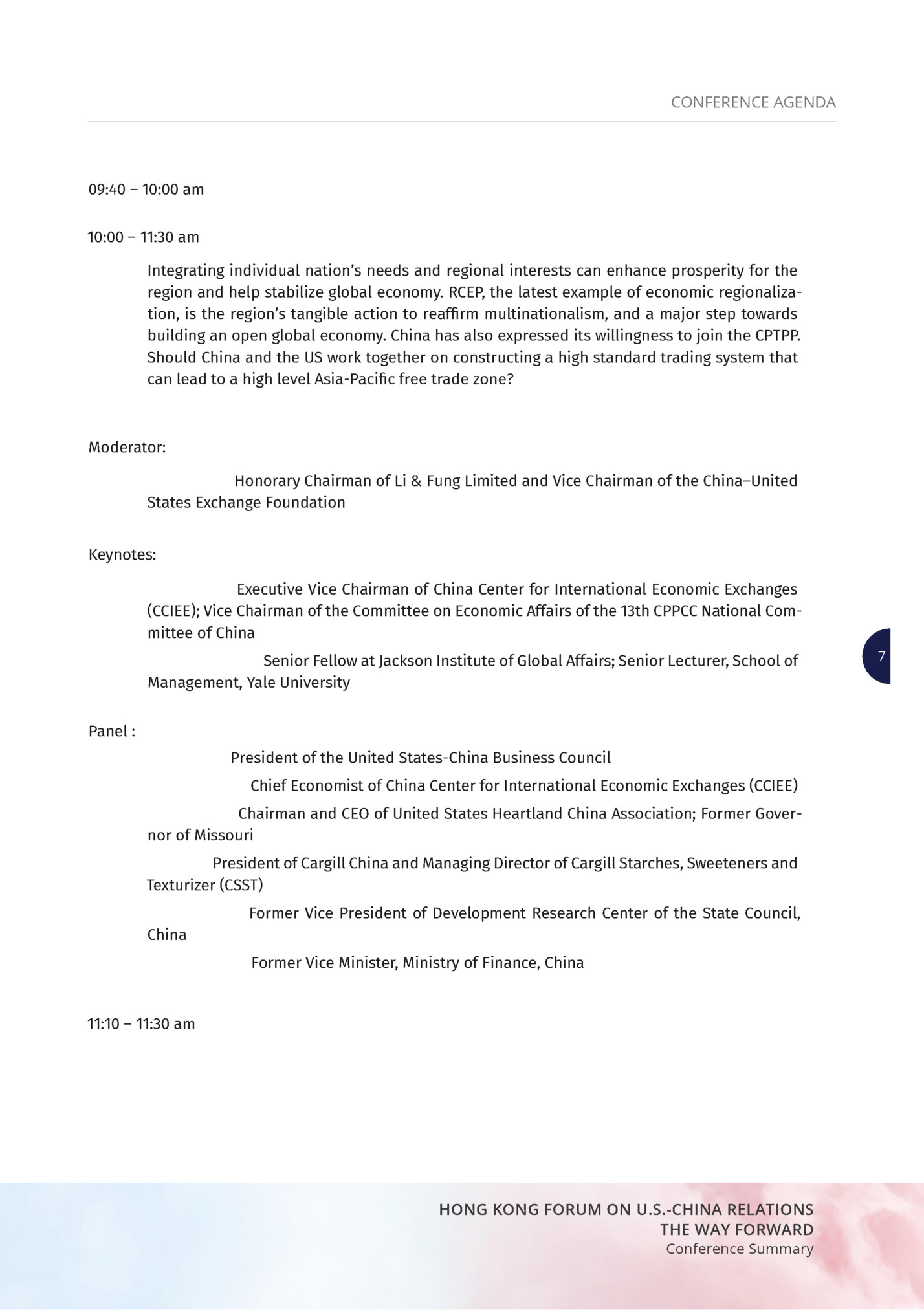
Fleepit Digital © 2021